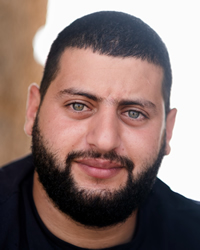Arab, Palestinian in Kuwait

Photo Source:
Levi Meir Clancy - Wikimedia
Creative Commons
|
Send Joshua Project a map of this people group.
|
| People Name: | Arab, Palestinian |
| Country: | Kuwait |
| 10/40 Window: | Yes |
| Population: | 40,000 |
| World Population: | 11,506,100 |
| Primary Language: | Arabic, Levantine |
| Primary Religion: | Islam |
| Christian Adherents: | 11.00 % |
| Evangelicals: | 1.00 % |
| Scripture: | New Testament |
| Ministry Resources: | Yes |
| Jesus Film: | Yes |
| Audio Recordings: | Yes |
| People Cluster: | Arab, Levant |
| Affinity Bloc: | Arab World |
| Progress Level: |
|
Introduction / History
The term Palestine originates with the Philistines, who inhabited the southern coast of the region in Biblical times. It fell into disuse until the Romans renamed that land “Palestine,” in part to spite the Jewish population. In 1917, the British captured the region from the Ottoman Empire and called it Palestine, after the long-standing Roman name for the area. This name has stuck. It sets Palestinians apart from other peoples in the Arabic-speaking world.
Today, there are Arab Palestinians worldwide. The majority live in the West Bank and the Gaza Strip (WBGS). Others consider themselves refugees and live in more than 24 countries (mainly the Middle East, Europe, North and South America).
Few Palestinians have assimilated into their host countries. Most Arab nations, such as Kuwait and Saudi Arabia, forbade Palestinian Arabs from becoming citizens. Palestinians feel a strong sense of identity with their Palestinian heritage and homeland; those in the Diaspora often have family in Israel/WBGS and feel deeply connected to their home country and people. Palestinians are working for their political and national rights in Israel and the West Bank as well as in the Diaspora.
What Are Their Lives Like?
The Palestinians are well known for their ongoing conflict with Israel, which receives large media coverage and is mostly within the context of war and destruction. The international media portrays Palestinians as either warmongers or weak victims. This is to ignore Palestinian success stories and achievements, especially by those in the Diaspora. Seldom does the press talk about Palestinian artists like Reem Kelani, a multitalented Palestinian, raised in Kuwait, who is singing traditional Palestinian songs, as well as Jazz and Blues. Kelani pursues a singing career, although she has received a doctorate in Coastal Marine Biology. Palestinian Arabs in Kuwait often have high-paying jobs as medical doctors and administrators. Others are common laborers. Many Palestinians are married to foreigners.
Palestinians are traditionally hospitable and prepare elaborate dinners for their guests, regardless of their economic position. Palestinian dishes usually consist of rice, chicken and vegetables cooked in different forms. Palestinians practice their traditional dances on any occasion, usually at weddings; poetry and music play a major part in their lives. The women are very skilled in traditional Palestinian embroidery and create beautiful traditional patterns.
What Are Their Beliefs?
Palestinians are predominantly adherents of Sunni Islam with a minority Christian community. The Palestinians can be from one of many Christian sects (Greek Orthodox, Ethiopian Orthodox, Nestorians, Syrian Orthodox, Armenians or Copts), and many of their people adopted Arabic as their primary language. "Palestinian" Arab Christian population began to assume a distinct identity.
What Are Their Needs?
During Gulf War 1, most Palestinians were forced to leave Kuwait because of official Palestinian support for Iraq's invasion of Kuwait. A small number remain. There is a constant aching in their hearts for Palestine. As a general rule, those who accept their situation have done well financially in the Diaspora.
Prayer Points
Pray for Palestinian Arabs to find new ways to contribute to the local economy and for them to find full employment.
Pray for a lasting and just peace in the West Bank and Gaza.
Pray for Palestinian disciples to make more disciples.
Pray for Palestinians to have the spiritual hunger it takes to find Jesus and live with the consequences in their communities.
Pray for entire Palestinian families to study God's word and to embrace the only savior.